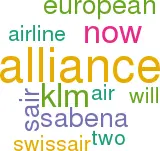SAir's historic breakthrough
May 2000


SAir Group is poised to make an historic breakthrough in the European aviation industry. By increasing its stake from 49.5% to 85% it will have effected the first take–over of one European flag–carrier by another.
The two airlines have been integrating their systems for some time, having pooled resources into a joint company, Airline Management Partnership. But now SAir has decided to go for a full legal merger of a type that most industry observers had assumed was impossible because of the nationality clauses in bilateral agreements.
Inside the European Economic Air Space there is no problem about Sabena’s new Swiss nationality (assuming that the Switzerland–EU ATA agreement is approved in the referendum to be held there on May 21). Outside the EU the situation is more problematic.
However, as Andrew Lobbenberg, analyst at Flemings Bank, points out the clauses in ATAs allow — but do not oblige — one country to refuse commercial operation by any airline from the other country if that country’s airline is not controlled by its nationals. In other words, it’s up to the bilateral partner to make life easy or difficult for Swiss–owned Sabena.
In Sabena’s case some 82% of its passengers are intra–Europe and another 8% are transatlantic. Just before the announcement that Swissair intended to take 85% of Sabena, the alliance between American, Swissair and Sabena received tentative approval from the US DoT for antitrust immunity. The DoT took the view that the connections offered by this new alliance would be similar to those offered in the previous alliance with Delta. It also stated that its approval was contingent on the two European airlines not joining oneworld.
So SAir seems to have covered most of the angles. And there does not seem to be any chance now of SAir getting into oneworld. Indeed, as an example of how solid that alliance is: BA has just decided that Amadeus will be its preferred IT partner for its distribution systems. Sabre lost out so there is now no coordinated oneworld CRS.
Meanwhile, the KLM/Alitalia alliance has officially collapsed over the vexed question of the development of the Malpensa hub, and KLM has asked for €100m back from Alitalia. Over the past decade KLM has entered into serious alliance negotiations with SAS, Sabena, Swissair and BA and failed in each case.
Two options now emerge for KLM. First, it could consider the Air France/Delta alliance, which will soon encompass Korean. A major problem would be the proximity of Schiphol and CDG and the consequent competition issues, and again commercial incompatibility. Also, Alitalia would probably now regard the Air France alliance as its best bet, especially if Continental could be brought in as well.
Second, KLM could embrace fully the BA–style strategy of downsizing, which it has already started to do, and focus totally on his most profitable sectors. For KLM this is an even more difficult strategy than it is for BA because its network is totally designed around its hub and spoke system.